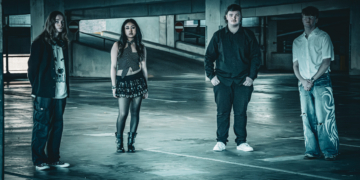Belfast’s own Travi the Native burst onto the scene with standalone singles COOL and SOFARSOGOOD turning heads and bending genres all at once. It shouldn’t be surprising, then, that EP God Only Calls The House Phone has been eagerly anticipated by critics and fans alike.
Framed by the interludes début, milieu, and fin, as my fellow amateur francophones may recognise as the French for start, middle and end, one may think of this EP as a tale of two acts, and it is certainly plausible that it was written as such. The opening half offers a unapologetically pompous, synth-pop and even juxtaposing take on lyrical themes of loss, change and abandonment. On the other hand, the latter half of the EP offers a raw, powerfully honest and unmasked take on the same themes, and the ease with which Travi is able to navigate opposing soundscapes, emotional states and vocal demands is a credit to both the artist and their production team.
In Début we hear Travi’s own Belfast accent, distorted, detailing his intentions for the track and the EP more broadly, speaking over a cluttered soundscape of soft electronic instrumentals together with less conventional sounds. It is instantly engaging for the listener, and makes for an interesting first listen, as we get to grapple with what exact sounds we’re hearing. The production is impeccable, and it’s so refreshing to hear such complex sonography from an artist so early in their career. This introduction of sorts concludes with spoken word alone, ‘…the first song just starts, and it’s like “oh, here we go.”
In near total contrast, SEEM2U opens with unabashed pomp. With a bubblegum riff that would sound at home on Taylor Swift’s 1989, or in one of the decade defining pop tunes of 1989 itself; and lyrical themes agonising over perception, mental health and insecurity that feel far more at home in the ‘sad girl’ culture of the early 2010s, this anthemic opener offers the listener a refreshing soundscape with substance.
Travi follows this with the more understated HEAVY LOVE. Lyrics about loss, change, and the haunting embrace of aging play over a radio-friendly electro-pop beat. A defining feature of this song is the vocal harmonies over the chorus which create an almost onomatopoeic sound, harking back to the heaviness of the track. When the vocals are isolated, they become even more impactful. This illustrates the best of Travi’s storytelling and the tracks’ production, and is truly a joy to listen to.
Interlude milieu follows, with a 57-second, stripped down piano riff that almost sounds ready-made for the movies. What is initially an ethereal, calming interlude transforms into a more chaotic instrumental towards the end, before fading into TIRED, the first song of the EP’s second half. TIRED has the powerful ability to sound like the emotion it’s describing. This is an often attempted and rarely well executed technique within song-writing, and one which is reminiscent of the likes of Wolf Alice and London Grammar. With an arguably simpler production style than earlier tracks, it offers a deeper dive into the same themes explored throughout the EP, we begin to see a more emotional insight from Travi into his experiences of growing older, feeling left behind, and being tired of all of it.
LDSAC, presumably an acronym for ‘Love Doesn’t Stand A Chance,’ further plays into the theme of loss explored throughout the EP, and offers a more genuine insight into the insecurity touched upon in earlier tracks. The sound of the song is perhaps the saddest of the EP, with harmony and repetition played out over a tinkling electronic beat. Travi’s regional accent can be heard clearly in his voice throughout this song, offering a more personal touch. Tension is created by the end of the song, as the various instruments and electronic elements build to a crescendo as Travi asks the title question, rhetorically, over and over. As the listener, we feel his pain, and this is a standout high point of the EP’s emotionality.
MOVE, the last full-length track of the EP, flawlessly combines the electronic and instrumental elements heard throughout, while Travi’s vocals navigate their broad range and a wealth of various difficult, and sometimes long notes. The song offers a kind of familiarity, and is aurally not dissimilar to Travi’s contemporaries such as Tebi Rex or even Hozier.
The EP concludes with fin which takes the album full circle with another voice recording, played over indecipherable, and yet strangely comforting, electronic sounds. This is an almost visceral conclusion to the EP, and leaves you excited to listen again, and even more so to see what this artist does next.








